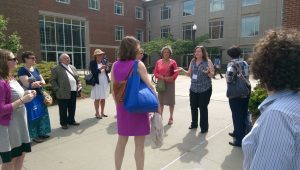This article is more than 5 years old.
On Tuesday, I attended my first Carolina Consortium meeting. I’ve attended similar meetings previously, but this one was truly unique for me in that electronic resources were the primary focus. E-books were, of course, dominant in the conversation of the day as more packages were being offered by many vendors and libraries considered the choices in a public setting. It was interesting to me to see the forum in this format, particularly with the amount of e-mails I’ve received relating to the business of the Consortium over the years.
I also had the chance to see UNCG’s Tim Bucknall in action for the first time. When I was in library school, I took a class with him about “Emerging Technological Trends in Information Access”, but since it was an online course I hadn’t met him face to face. I have to commend him and his team at UNCG for the work they have put into building this Consortium among such a diverse group of libraries from North and South Carolina. The fact that we are able to receive discounted prices on so many electronic products is a quite an achievement, especially since there is no formal governing structure that is present with other library consortia across the country.
In addition to sessions about new deals for the Consortium and new products from the attending vendors and publishers, there was one breakout session that stood out to me. This session, “Evolving Consortial Roles in Collection Development and Acquisitions”, addressed how a consortium may shift its focus in response to the needs of its respective members. This session was presented by two librarians from the PASCAL consortium in South Carolina, and they shared how they were able to coordinate a short-term loan program for specific e-book packages across the entire state. (I plan to retrieve the slides for their presentation when they become available!) This is an interesting concept to approach an escalating problem, and it could be an opportunity of some fashion here in North Carolina.
Finally, as Carol mentioned in her post, there was a fire alarm during the Lightning Round sessions that closed the day. Coincidentally, Carol had mentioned the emergency exit doors on one side of the anteroom as we walked into the theatre in the Elliott University Center. As the fire alarm blared overhead, Carol remembered those doors and directed several members of the audience to follow us outside to the safety of a nearby courtyard. With the delay caused by arriving fire trucks and the required safety checks for the building, the decision was made by conference organizers to wrap early so that attendees with long commutes could head home. However, like the rest of the presentations at the conference, slides from all of Lightning Rounds would be available online at a later date.
UNCG’s Beth Bernhardt (third from right) thanks attendees outside of the Elliott Center.
This was a conference of firsts for me, but it was a well done event with a lot of shared information. From an acquisitions perspective, I found this to be a valuable meeting that I would attend again.


1 Comment on ‘Chris at the 2015 Carolina Consortium Meeting’
Chris, I also took Tim’s class online and have never met him in person! It sounds like it was a productive day in spite of the fire alarm!